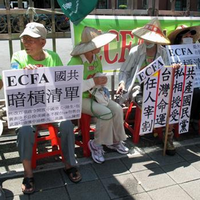Russia and Japan recently reached an agreement to build a joint liquefied natural gas plant in Vladivostok, Russia. In an e-mail interview, Michael Bradshaw, professor of human geography at the University of Leicester and vice president for Research and Higher Education at the Royal Geographical Society, discussed Russia-Japan energy cooperation. WPR: What is the status quo of Russia-Japan energy cooperation? Michael Bradshaw: Russia has only recently become a significant supplier of oil and gas to Japan. The Sakhalin-1 and Sakhalin-2 projects have progressively exported oil and liquefied natural gas (LNG) to Japan since 1999, and both have Japanese shareholders. The […]
East Asia Archive
Free Newsletter

TAIPEI, Taiwan — Six months after the hotly contested signing of a controversial cross-strait trade pact, Taiwan may be beginning to accept talks with China as business as usual. Only a few dozen desultory protesters could be seen waving signs around in the bitter winter air in Taipei during the latest round of cross-strait negotiations last month. Police officers assigned to preserve the peace appeared more relaxed than during past talks, perhaps confident they wouldn’t need to exert themselves pulling apart mobs around Chinese envoy Chen Yunlin’s hotel. Flash back to June 2010, in the sweltering last few weeks leading […]
The consensus has it that the big winner of the Iraq War was Iran, in that the toppling of the Saddam Hussein regime removed the major barrier containing Iran’s regional ambitions. Certainly the Shiite-dominated and Iran-friendly government in Baghdad has freed up Tehran’s hand across the region — even if, as I’ve argued before, the inherently volatile nature of Iraqi politics means that Iran has inherited some time- and energy-consuming responsibilities in Iraq along with its increased influence. But I’d argue that the fears among Middle Eastern Arab states of Iran’s growing regional reach have more to do with their […]
Daewoo Shipbuilding & Marine Engineering, a South Korean shipbuilder, recently submitted a $3.5-billion bid for a Brazilian warship contract. In an e-mail interview, Mingi Hyun, research fellow at the Korea Institute for Maritime Strategy (KIMS), discussed South Korea’s naval shipbuilding sector. The opinions expressed here do not necessarily reflect those of KIMS. WPR: What is the current state of the South Korean military shipbuilding sector? Mingi Hyun: Korea possesses a capable naval shipbuilding sector, composed of four government-designated naval shipbuilders: Daewoo Shipbuilding & Marine Engineering (DSME), Hyundai Heavy Industries (HHI), Hanjin Heavy Industries & Construction (HHIC) and STX Offshore & […]
